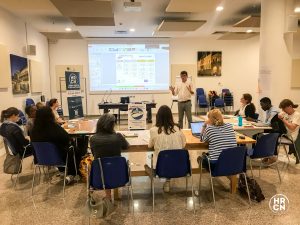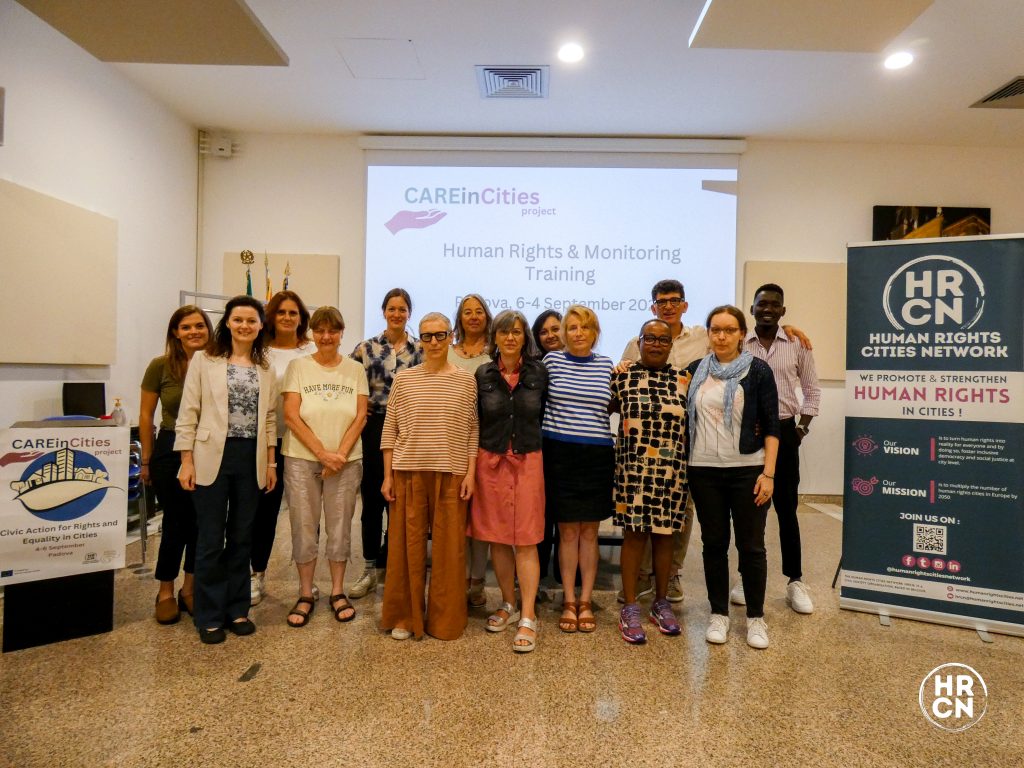How can we bring together civil society organisations, academic researchers, and municipal officials to monitor the human rights impacts and the level of inclusion of their social policies and services?
The Civic Action for Rights and Equality in Cities (CAREinCities) project is trying to answer this question through a set of activities involving two cities, Padova (Italy) and Gent (Belgium). The project reunited a diverse community from both cities, to reflect and work together around that question.
 The first step was to train the participants on Human Rights & Monitoring in Padova, in the beginning of September. Both cities were introduced to the human rights monitoring methodology by the United Nations Human Rights Office of the High Commissioner (OHCHR) Europe, and to the EU Charter of Fundamental Rights by the Human Rights Cities Network (HRCN), to support their action towards the protection and promotion of human rights.
The first step was to train the participants on Human Rights & Monitoring in Padova, in the beginning of September. Both cities were introduced to the human rights monitoring methodology by the United Nations Human Rights Office of the High Commissioner (OHCHR) Europe, and to the EU Charter of Fundamental Rights by the Human Rights Cities Network (HRCN), to support their action towards the protection and promotion of human rights.
Representatives from both cities were trained to apply a results-based approach in their projects and programmes, from reporting delivered outputs to the monitoring and analysis of indicators, measuring the change that local projects and programmes bring in citizens’ access to their rights.
The importance and usefulness of the concepts and tools were recognised by all the participants, and some insightful views were shared.
From the municipal side, we heard the following:
“W
e have been looking for a while at how to monitor impact on social themes such as integration and human rights policies, and we always struggled to find time to do so. The tools we learned about are very easy to implement in our day-to-day work, and this is a gain for everybody. It is not only helping our partners to easily track what they are doing, but it also allows us to monitor if we achieve the change we want for our city”.
Similarly, a representative from a local association working on poverty said:
“The training was very helpful to reflect on our practices. The most interesting part for us is to know that we can design more feasible projects, and monitor if the steps we are taking are really leading us towards our goal to help more people to get access to human rights. What we learnt here can support municipal officers, politicians and local organisations to work together to help people to access their human rights”.
A researcher in human rights expressed the following:
“This course is very useful for academic researchers like me. I study local and regional governance for my PhD thesis, and it was really interesting to understand that what is behind what I study is planning. During the training, I learnt how not to get ‘lost in translation’ when a plan is translated into a project and the added value when a project is translated into monitoring”.
The Human Rights Cities Network, through the CAREinCities project, proposes a participatory methodology to allow different actors from local authorities and civil societies – including academics – to co-design a monitoring system that guides local policies towards a human rights-based approach. This methodology will be tested by the cities of Padova and Gent through a set of online and in presence workshops in the following weeks.
The next step will be to implement this methodology in ten European cities in the framework of the Boost Democratic Participation in Cities to Recharge Democracy in Europe – DeCiDE project in the next following two years.



